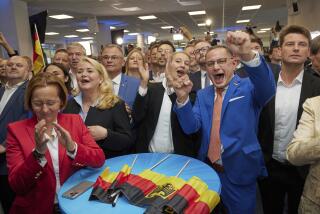Separatists May Gain in Czechoslovak Vote : Election: A strong showing by the Slovak nationalist party could redirect country’s economic flow.
- Share via
PRAGUE, Czechoslovakia — Citizens began voting Friday to elect a new legislature, one that could set the economic course for Czechoslovakia and bring the Slovak separatist cause a step closer to resolution.
Polls indicate that the Slovak nationalist party, the Movement for an Independent Slovakia headed by Vladimir Meciar, is the leading preference of Slovakia’s voters. Meciar, playing hard on nationalist sentiments, has pledged that his voters will lead the fight to tailor the federal republic’s economic policies to assist his region’s hard-hit state-run industries.
In the Czech lands of Bohemia and Moravia, where market-oriented reforms are making good headway, polls show that the Civic Democratic Forum party, headed by Finance Minister Vaclav Klaus, is running at the front of a pack of about 20 parties. About 20 parties are also in the contest in Slovakia.
Most Czechoslovak politicians say they are resigned to a lengthy round of coalition-building after the election. In essence, they say, the Slovak side of the new Federal Assembly will be generally leftist in character, while the Czech side is more likely to be dominated by rightist market reformers.
It will be up to President Vaclav Havel to appoint a prime minister and Cabinet after negotiations between the leading parties.
Once the government is appointed, the Federal Assembly will elect the president. Havel is the only serious candidate, and his election could be threatened only if a stubborn bloc of Slovak deputies decide to use their presidential votes as leverage over government appointments.
As one of three key countries, together with Poland and Hungary, in a changing Eastern Europe, Czechoslovakia is finding that the fault lines of post-Communist politics follow a consistent pattern of nationalist versus reformist blocs.
Czechoslovakia’s first post-Communist elections in 1990 amounted to a referendum on Communist rule, and the Communists, predictably enough, resoundingly lost.
Speaking of the current balloting, Jiri Dienstbier, a former dissident who has been foreign minister for the past two years, said: “This is not an election to see whether democracy will stay or not. It is an election to see what kind of face this democracy will have.”
Since the 1990 elections, some of the harsh realities of the free-market system have kicked in--unemployment (up to 11% in industrial Slovakia, a region where it was virtually unheard of for four decades), rising prices and the sudden appearance, jarring to many, of wide gaps in income.
Pensioners or those who are less economically fortunate can be seen counting out their money carefully at the grocery, while others race about in sleek, new German sedans. The disparity is unnerving to many, creating a phenomenon of envy or suspicion, which Havel in various essays has identified as the darker result of the 1989 revolution against the Communists.
Economic disparity is driving the issue of nationalism in Slovakia, most analysts say.
Public opinion polls have consistently showed that Slovaks are opposed to a total separation--or outright independence--from the Czech republic. But there is a widespread feeling among the Slovaks that economic reforms devised by Finance Minister Klaus strongly favor the Czechs.
But Czechs have argued that Slovaks get more than their fair share of the federal budget.
More to Read
Sign up for Essential California
The most important California stories and recommendations in your inbox every morning.
You may occasionally receive promotional content from the Los Angeles Times.













